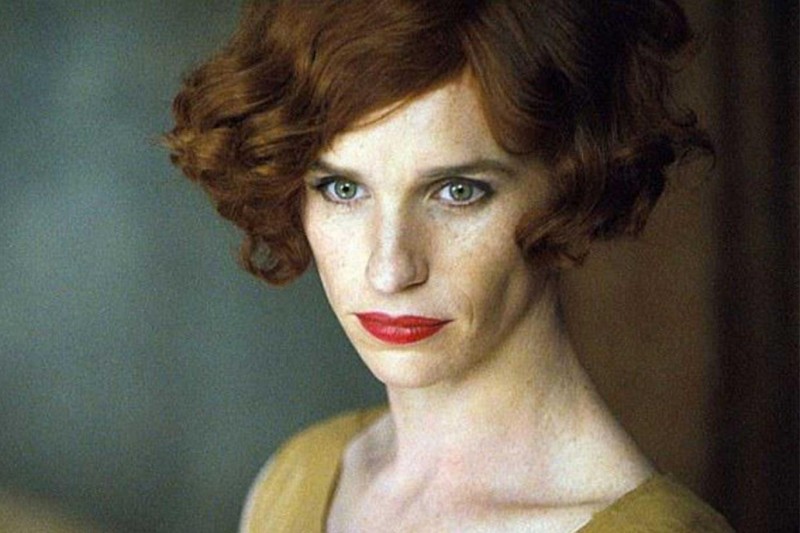The Danish Girl Review
"Eddie Redmayne undergoes another stunning transformation in the good, but not great Danish Girl."
Tom Hooper, director of
The Danish Girl, manages to disguise a story that echoes today’s current events as a prim and modest period piece. Much like Hooper’s Academy Award Winning
The King’s Speech, instead of crafting a character study focusing solely on the protagonist,
The Danish Girl focuses on the character’s personal transformation as well as the one within his marriage.
Einar Wegenar (Eddie Redmayne) and his wife Gerda are painters in 1920’s Europe. Gerda is a portraitist and Einar is a landscape artist, who has a larger measure of fame than his wife. Because of this they are not only compatible partners, they push each other competitively.

Gerda desires to attend the Copenhagen Artists’ Ball while Einar is reluctant. For fun Gerda suggests he attend the ball with her as her female cousin, and she trains him to be the most convincing woman he can possibly be. Soon after Gerda and Einar arrive at the ball, Henrik (Ben Whishaw), is immediately taken with Gerda’s cousin, who has now christened herself Lili. Once Henrik and Lili share a romantic moment alone away from the crowd, Einar cannot continue to pretend that Lili is just a game.
The Danish Girl is based on David Ebershoff’s novel of the same name. It is a fictionalized biography of Lili Elbe, one of the first people to attempt gender reassignment surgery. Although Lili may be perceived as a pioneer in the transgender community, here in Hooper’s version, she is not portrayed as a heroine at all - she is actually quite selfish. Einar never actually takes Gerda into account while entering his transformation, he is confident in his change and expects her to be the loving wife she has always been.
Strong willed Gerda does not accept these circumstances and this film is just as much about her struggle as it is Einar’s. She goes so far as to recruit the help of Einar’s childhood friend, Hans (Matthias Schoenaerts), to help return Einar to his senses. Each of her efforts prove to be more and more futile. Watching Gerda slowly lose her husband and best friend while simultaneously standing by his side provides the emotional narrative that drives this story.

Eddie Redmayne’s performance is so good, it’s polarizing. Whenever he appears on screen as Lili, it’s not really the physical transformation of Lili that sells his performance, it’s the nuances that he adds to the character that makes Lili so breathtaking. From the gentle way her hand touches her face, to how she slightly bows her head, even the dainty way she holds her purse, Lili commands your attention every time she’s onscreen. Alicia Vikander is commanding as Gerda. Gerda is the wife is expected to stand by her husband, even though he is slowly erasing her from his life. She portrays Gerda as hurt, but not desperate. She does not resort to begging to get her husband back. Her dignity is never sacrificed. There is an authority in Vikander’s performance that the film needs to balance Redmayne’s constant emotional turmoil.
Overall, the
Danish Girl is a good film, but not a great one. The transformation from Einar to Lili, seemed a little fast. We do not see many scenes of Einar and Gerda as a happily married couple. It may have given us a little more sympathy for Einar/Lili as we watch their marriage crumble. We respect Gerda, but we do not really feel sorry for her. We know she will go on. Also, Gerda's support for Einar during his change is not surprising as they seem more like best friends as opposed to lovers. Being best friends in a marriage is a great thing, but a better sense of the great romantic love that Gerda loses would have given the film just a tad more dramatic weight.
Pros
- Excellent performances
- Good cinematography
- Interesting premise
Cons
- More character development needed for the two main characters
- Main character can be too unlikeable at times
 Gerda desires to attend the Copenhagen Artists’ Ball while Einar is reluctant. For fun Gerda suggests he attend the ball with her as her female cousin, and she trains him to be the most convincing woman he can possibly be. Soon after Gerda and Einar arrive at the ball, Henrik (Ben Whishaw), is immediately taken with Gerda’s cousin, who has now christened herself Lili. Once Henrik and Lili share a romantic moment alone away from the crowd, Einar cannot continue to pretend that Lili is just a game.
The Danish Girl is based on David Ebershoff’s novel of the same name. It is a fictionalized biography of Lili Elbe, one of the first people to attempt gender reassignment surgery. Although Lili may be perceived as a pioneer in the transgender community, here in Hooper’s version, she is not portrayed as a heroine at all - she is actually quite selfish. Einar never actually takes Gerda into account while entering his transformation, he is confident in his change and expects her to be the loving wife she has always been.
Strong willed Gerda does not accept these circumstances and this film is just as much about her struggle as it is Einar’s. She goes so far as to recruit the help of Einar’s childhood friend, Hans (Matthias Schoenaerts), to help return Einar to his senses. Each of her efforts prove to be more and more futile. Watching Gerda slowly lose her husband and best friend while simultaneously standing by his side provides the emotional narrative that drives this story.
Gerda desires to attend the Copenhagen Artists’ Ball while Einar is reluctant. For fun Gerda suggests he attend the ball with her as her female cousin, and she trains him to be the most convincing woman he can possibly be. Soon after Gerda and Einar arrive at the ball, Henrik (Ben Whishaw), is immediately taken with Gerda’s cousin, who has now christened herself Lili. Once Henrik and Lili share a romantic moment alone away from the crowd, Einar cannot continue to pretend that Lili is just a game.
The Danish Girl is based on David Ebershoff’s novel of the same name. It is a fictionalized biography of Lili Elbe, one of the first people to attempt gender reassignment surgery. Although Lili may be perceived as a pioneer in the transgender community, here in Hooper’s version, she is not portrayed as a heroine at all - she is actually quite selfish. Einar never actually takes Gerda into account while entering his transformation, he is confident in his change and expects her to be the loving wife she has always been.
Strong willed Gerda does not accept these circumstances and this film is just as much about her struggle as it is Einar’s. She goes so far as to recruit the help of Einar’s childhood friend, Hans (Matthias Schoenaerts), to help return Einar to his senses. Each of her efforts prove to be more and more futile. Watching Gerda slowly lose her husband and best friend while simultaneously standing by his side provides the emotional narrative that drives this story.
 Eddie Redmayne’s performance is so good, it’s polarizing. Whenever he appears on screen as Lili, it’s not really the physical transformation of Lili that sells his performance, it’s the nuances that he adds to the character that makes Lili so breathtaking. From the gentle way her hand touches her face, to how she slightly bows her head, even the dainty way she holds her purse, Lili commands your attention every time she’s onscreen. Alicia Vikander is commanding as Gerda. Gerda is the wife is expected to stand by her husband, even though he is slowly erasing her from his life. She portrays Gerda as hurt, but not desperate. She does not resort to begging to get her husband back. Her dignity is never sacrificed. There is an authority in Vikander’s performance that the film needs to balance Redmayne’s constant emotional turmoil.
Overall, the Danish Girl is a good film, but not a great one. The transformation from Einar to Lili, seemed a little fast. We do not see many scenes of Einar and Gerda as a happily married couple. It may have given us a little more sympathy for Einar/Lili as we watch their marriage crumble. We respect Gerda, but we do not really feel sorry for her. We know she will go on. Also, Gerda's support for Einar during his change is not surprising as they seem more like best friends as opposed to lovers. Being best friends in a marriage is a great thing, but a better sense of the great romantic love that Gerda loses would have given the film just a tad more dramatic weight.
Eddie Redmayne’s performance is so good, it’s polarizing. Whenever he appears on screen as Lili, it’s not really the physical transformation of Lili that sells his performance, it’s the nuances that he adds to the character that makes Lili so breathtaking. From the gentle way her hand touches her face, to how she slightly bows her head, even the dainty way she holds her purse, Lili commands your attention every time she’s onscreen. Alicia Vikander is commanding as Gerda. Gerda is the wife is expected to stand by her husband, even though he is slowly erasing her from his life. She portrays Gerda as hurt, but not desperate. She does not resort to begging to get her husband back. Her dignity is never sacrificed. There is an authority in Vikander’s performance that the film needs to balance Redmayne’s constant emotional turmoil.
Overall, the Danish Girl is a good film, but not a great one. The transformation from Einar to Lili, seemed a little fast. We do not see many scenes of Einar and Gerda as a happily married couple. It may have given us a little more sympathy for Einar/Lili as we watch their marriage crumble. We respect Gerda, but we do not really feel sorry for her. We know she will go on. Also, Gerda's support for Einar during his change is not surprising as they seem more like best friends as opposed to lovers. Being best friends in a marriage is a great thing, but a better sense of the great romantic love that Gerda loses would have given the film just a tad more dramatic weight.